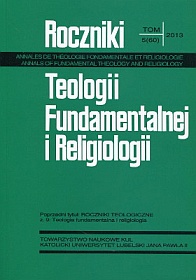The pluralistic model of truth
Abstract
On the grounds of the analysis made by the author of the elaboration one can notice a strong tendency to the relativisation of truth performing in the context of the pluralist theology of religion. Representatives of the aforementioned trend want to question the objective character of truth. Such actions are aimed at leading to the statement that all religions are equally exceptional. To clearly understand the theses of pluralists, philosophical foundations of the pluralist theology of religion have been depicted. It must be stated that pluralists use philosophical notions selectively and instrumentally, which makes it possible to reach desirable conclusions.
The contestation of the absolute and objective character of truth has serious consequences and exerts an influence upon the understanding of interreligious dialogue. The problem of resignation from one's own religious identity appears. Defending themselves against such an accusation, pluralists introduce the concept of orthopraxis as the criterion of truth. Consequently, the determinant of truth is its ability to realize itself in the proper demeanour. Views presented in the pluralist theology of religion constitute a serious reproach to Christian truth as well as biblical truth.
References
Bartnik Cz. S.: Historia filozofii. Lublin: Gaudium 2001(2).
Bokwa I.: Filozoficzno-kulturowe tło pluralistycznej teologii religii. „Studia Theologica Varsaviensia” 44: 2006 nr 1 s. 115-137.
Bronk A.: Postmodernizm. W: Leksykon teologii fundamentalnej. Red. M. Rusecki (red. naczelny), K. Kaucha, I. S. Ledwoń, J.Mastej. Lublin−Kraków: Wydawnictwo M 2002 s.929-936.
Chrzanowski G.: Zagadnienie prawdy w kontekście pluralizmu religijnego. „Przegląd Religioznawczy” 2:2004 s. 113-121.
Chrzanowski G.: Zbawienie poza Kościołem. Filozofia pluralizmu religijnego Johna Hicka. Poznań: W drodze 2005.
Dola T.: Koncepcja pluralistycznej teologii religii. „Studia Teologiczno-Historyczne Śląska Opolskiego” 15:1995 s.19-30.
Dola T.: Krytyka pluralistycznej teologii religii. W: Teologia religii. Chrześcijański punkt widzenia. Red. G. Dziewulski. Łódź−Kraków: Wydawnictwo Księży Sercanów 2007 s.63-76.
Forte B.: Istota chrześcijaństwa. Lublin: Wydawnictwo KUL 2007.
Fredericks J. L.: Faith among Faiths. Christian Theology and Non-Christian Religions. New York: Paulist Press 1999.
Gibbs P.: The World in the Third World: divine revelation in the theology of Jean Marc-Ela, Aloysius Pieris and Gustavo Gutiérrez Roma: Editrice Pontificia Università Grgoriana1996. http://books.google.pl/ books?id=iHKP0v_7iWcC&printsec= frontcover#v=onepage&q=&f=false
Gilkey L.: Plurality and Its Theological Implications. W: The Myth of Christian Uniqueness. Toward a Pluralistic Theology of Religions. Red. J. Hick, P.F. Knitter. Oregon: Wipf and Stock 1987 s. 37-50.
Kaucha K.: Pluralistyczno-relatywistyczna teologia religii J.Hicka iP.F. Knittera. W: Chrześcijaństwo a religie. Dokument Międzynarodowej Komisji Teologicznej. Tekst – komentarze – studia. Red. I. S. Ledwoń, K. Pek. Lublin−Warszawa: Wydawnictwo Księży Marianów 1999 s. 123-135.
Klinger E.: Prymat ortodoksji czy ortopraksji? W: Chrześcijaństwo jutra. Materiały IIMiędzynarodowego Kongresu Teologii Fundamentalnej (Lublin, 18-21 września 2001). Red. M. Rusecki, K. Kaucha, Z. Krzyszowski, I. S. Ledwoń, J. Mastej. Lublin: TN KUL 2001 s.565-589.
Knitter P. F.: Introducing Theologies of Religions. New York: Orbis Books 2002.
Knitter P. F.: No Other Name? A Critical Survey of Christian Attitudes Toward the World Religions. New York: Orbis Books 1985.
Kondrat K.: Filozofia analityczna wobec pluralizmu religijnego. Białystok: Wydawnictwo Uniwersytetu w Białymstoku 2000.
Kubacki Z.: Jedyność Jezusa Chrystusa. O jedyności i powszechności zbawczej Jezusa Chrystusa w kontekście chrześcijańskiej teologii religii. Warszawa: Rhetos 2005.
Ledwoń I. S.: „…i nie ma w żadnym innym zbawienia”. Wyjątkowy charakter chrześcijaństwa w teologii posoborowej. Lublin: Wydawnictwo KUL 2006.
Ledwoń I. S.: Pluralistyczna teologia religii. W: Teologia religii. Chrześcijański punkt widzenia. Red. G. Dziewulski. Łódź−Kraków: Wydawnictwo Księży Sercanów 2007 s.35-54.
Łagodzki W., Pyszczek G.: Oświecenie. W: Leksykon PWN. Filozofia. Red. W.Łagodzki, W. Pyszczek. Warszawa: Wydawnictwo Naukowe PWN 2000 s.249-251.
Łagodzki W., Pyszczek G.: Relatywizm. W: Leksykon PWN. Filozofia. Red. W.Łagodzki, W. Pyszczek. Warszawa: Wydawnictwo Naukowe PWN 2000 s.285-286.
Netland H. A.: Dissonant Voices: Religious Pluralism and the Question of Truth. Vancouver: Regent College Pub. 1997.
O'Leary J. S.: Religious Pluralism and Christian Truth. Edinburgh: Edinburgh University Press 1996.
Panikkar R.: The Jordan, the Tibet, and the Ganges. Three Kairological Moments of Christian Self-Consciousness. W: The Myth of Christian Uniqueness. Toward a Pluralistic Theology of Religions. Red. J. Hick, P. F. Knitter. Oregon: Wipf and Stock 1987 s. 89-116.
Race A.: Christians and Religious Pluralism: Patterns in the Theology of Religions. New York: Orbis Books 1983.
Ratzinger J.: Wiara i teologia dzisiaj. „L'Osservatore Romano” 3:1997 s. 47-53.
Rusecki M.: Istota i geneza religii. Lublin−Sandomierz: Wydawnictwo Diecezjalne 1997.
Smith W. C.: Idolatry in Comparative Perspective. W: The Myth of Christian Uniqueness. Toward a Pluralistic Theology of Religions. Red. J. Hick, P. F. Knitter. Oregon: Wipf and Stock 1987 s.53-68.
Thoppil J.: Christology, Liberation and Religious Pluralism. A Critical Study of M. M. Thomas, P. F. Knitter and G. D'Costa. Roma 1998.
Życiński J.: Postmodernistyczny pragmatyzm jako negacja klasycznej koncepcji prawdy. W: Studia z filozofii Boga, religii i człowieka. T. 1: Filozofia i teologia w życiu człowieka. Red. P. Mazanka. Warszawa: ATK 2001 s.62-75.
Copyright (c) 2013 Roczniki Teologii Fundamentalnej i Religiologii

This work is licensed under a Creative Commons Attribution-NonCommercial-NoDerivatives 4.0 International License.

